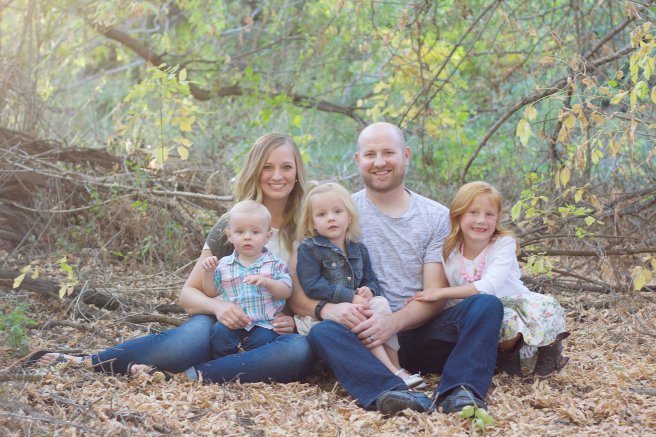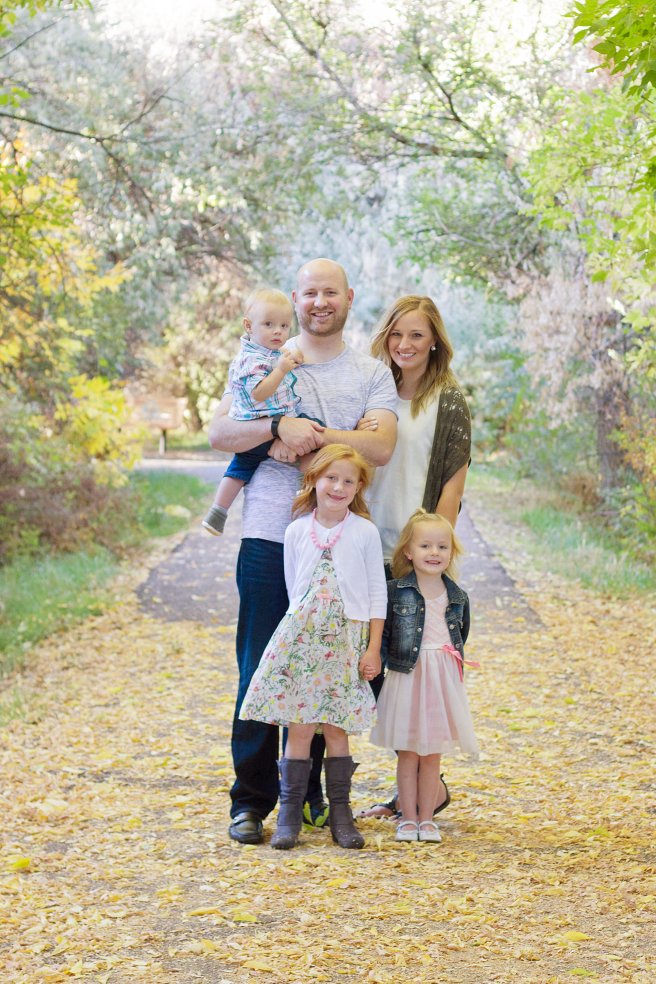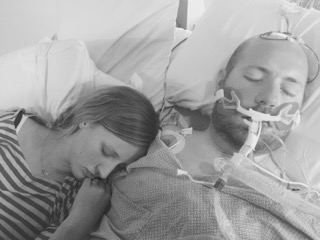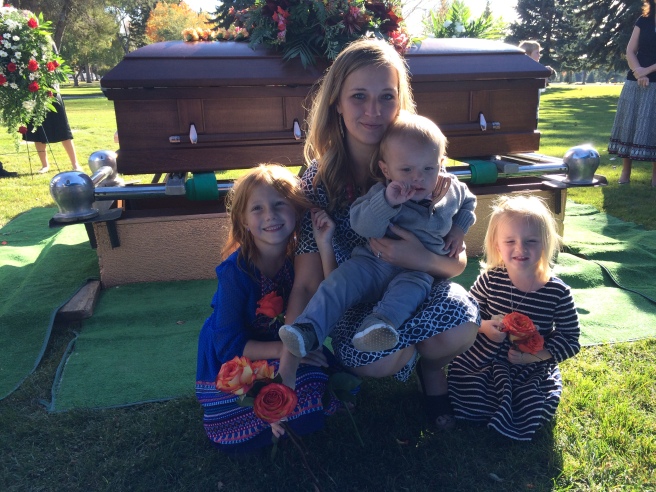Have you ever had a nightmare about death–either your own, or someone you love?
I remember one night, only a few years ago, I woke up to my husband sobbing in bed next to me. He’d had a dream about me being sick. In his dream, he had fought to save me, but his efforts had been futile, and I had passed away leaving him alone to raise our children. It had been one of those dreams when it is difficult to distinguish subconscious thoughts from reality, and he was so relieved to find me sleeping next to him when he finally woke from his nightmare. I remember hugging him and telling him that I was fine, and that I wasn’t going anywhere.
Ironic right?
I know that I have also had times, when I have heard heartbreaking true stories or have watched movies like “P.S. I Love You” and I have become absorbed in the “second hand heartbreak.” I have wondered what I would ever do if I lost a spouse, a child, a sibling, or a parent. The pain, even with an imagined loss was heart wrenching.
But why? Why do we as a culture feel so drawn to sad stories?
I think the inevitability of loss makes us curious. We all know that at some point in our lives, we will experience grief. No one is immune to mortality or heartache. It makes us wonder what it really feels like to lose someone dear to our heart. It was always something that I was intrigued by, and something that I wanted to understand better.
Until it actually happened to me.
For those who are new to this blog, let me give you a quick overview of my story.
——————————————————————————————————————–
My name is Monica. I married my husband, Ryan J Bell (RJ), on February 22, 2007. We were married for almost 9 years. In that time, we had 3 beautiful children, a house, a great career path, dreams, and that best friend kind of love that I had dreamed about as a girl. Life wasn’t perfect, but it was wonderful. He was my best friend.


My husband woke up one morning (October 15, 2015), and while he was getting ready for work, he had a few seconds where he was “seeing spots”–just for a moment. As he sat on the edge of our bed, I tried to talk him into staying home and resting. He was convinced that he was fine, and that the spots were due to a mild headache that he was experiencing. He took an Advil, dropped our first grader off at school, and started his commute to work.
Ten minutes into his drive, I got a phone call. He’d had an extreme wave of nausea, and he was vomiting violently on the side of the road. He was unable to drive. I hurried to where he was waiting with a police officer on the side of the interstate, and took him home to rest in bed. We assumed at that point that he had food poisoning or a horrible virus.
About an hour later, he was complaining of severe head pain, dizziness, and was vomiting uncontrollably. I left my children with his parents, and took him to the emergency room. After a few hours of waiting, IV fluids, a CT scan, and some medication we were sent home with a diagnosis: an inner ear calcification. We were instructed to take some prescription medication, and to come back if it didn’t improve in a few days. He was extremely ill by this point, and he wasn’t able to walk without assistance because of the severity of his dizziness and pain. I took him home, tucked him in, and after turning on a movie for my children and in-laws, I ran to the pharmacy to get his prescriptions. He would be due to take within a short time, and I didn’t want him to experience more pain than was necessary.
While I was gone, RJ got up to go to the bathroom and fell. When I called to check on him, I was confused at the news–he wasn’t making any sense. He was having a hard time talking.
I rushed home and found my strong, capable, healthy, thirty one year old husband struggling to form words. His many symptoms were horrifying, and I knew immediately that something was seriously wrong. We called 911 and were taken by ambulance back to the hospital. He received more scans and tests, and my worst fears were confirmed.
A massive stroke in his cerebellum.
I was handed a cell phone by one of the doctors. On the line was the lead neurosurgeon that would be taking on my husband’s case. I remember only snippets of our conversation as I heard the worst imaginable news. It was the stuff of my worst nightmares coming true.
“The area where Ryan has suffered this stroke is very difficult to operate on.”
“We will do everything in our power to save him.”
“We will use extraordinary measures to preserve his life.”
“This surgery has a 90 percent mortality rate.”
I sat on the floor in an empty hospital room and sobbed. My husband had a ten percent chance of living. TEN percent. And even if he did survive, there was no telling the effect that the lack of oxygen would have on his brain. He was taken to a hospital better equipped to handle such a surgery.
With a stroke, seconds matter. It took hours to get him where he needed to be, because there wasn’t an available helicopter in our area. And when it did finally get to us, there wasn’t room for me to go with them, because my husband required too much medical equipment to keep him alive. My in laws and I made the excruciating drive to the hospital where my husband was receiving surgery. I was afraid of what I might find when I finally got there.
The surgery truly was a miracle. Ryan made it through, and he was one of the ten percent to pass that crucial point. I was filled with hope, and for a short time believe that he would recover. I remember sobbing on his surgeons shoulder, hugging him, and thanking him profusely for saving my husband’s life.
And then he became unstable. Severe swelling in the brain. A second surgery.
And then we waited.
“He should wake up in a couple of hours.” He didn’t.
“His brain has experienced severe trauma. These things can take time.” Still no change.
I laid in the bed beside him and held his hand. I begged him to wake up for days. I cried, and told him that I loved him. I told him that his children needed him. I told him that I didn’t know how to live without him. I shook uncontrollably, cried off an on, lost my appetite completely, and threw up anything I did manage to get down. I called friends and hugged family. I listened to the never ending beeps, to the clock ticking, and to the machines that filled my husband’s lungs with air. I memorized every part of his face. And I waited. 
I will always remember the neurosurgeon’s pained expression when he sat down to tell me his recommendation: to remove life-support. He told me that Ryan wasn’t going to wake up. His brain stem was too severely damaged to be able to survive without the machines that were only prolonging the inevitable.
It was too late.
Five days after his initial stroke, our families and friends gathered together to say goodbye. I gathered my children in a small meeting room, and forced myself to talk calmly when I told them that their Daddy was going to heaven. I held them while they said goodbye to their Father. I watched the man I loved more than anything take his last breath. My heart felt very literally ripped from my chest when I finally left his body. It hurt to breathe, I was devastated, numb, and in shock all at the same time. It was like living in a nightmare, and not being able to wake up.
My husband passed away on October 19, 2015.

——————————————————————————————————————
I know how it feels to lose someone who I love more than my own life. It truly is indescribable. But I will do my best, to bring a better understanding of grief, for the sake of any of you who are just beginning your own difficult journey through grief. If my experience can help bring clarity or hope to anyone who is going through what I have, for me, it is worth every second of sharing my story, and I will happily relive the pain. You aren’t alone.
I had heard about the “Five Stages of Grief” before experiencing loss. The stages denial, anger, bargaining, depression, and acceptance make grief sound so cut and dry. It makes it seem like a neat little process that is very linear. That grief is something that one experiences, that is passed through in sensible phases, and then after completing four messy phases, one is finally able to accept their loss and move on.
But there is no “moving on.” And I have found grief to be anything but neat and tidy. It is anything but predictable. Grief is feeling every single emotion imaginable, and having your body completely shut down because it is too much for it to take in all at once. Grief is feeling like you are literally going crazy, only to be told that you are completely normal. Grief is feeling incomplete, like a piece of yourself is missing. And it is. You have to find a new you because so much of your identity was linked to the one that you loved.
Grief isn’t a process that you pass through, but a painful awakening that becomes a part of you.
Although grief is volatile and the emotional rollercoaster IS very real, there has been a general movement through some stages (especially initially) in my experience. My loss was an unexpected one, and though I can really only speak for myself, I imagine that others going through similar experiences can relate to some extent.
The first “stage,” for me, was disbelief. I watched my husband in the hospital, but couldn’t believe that it was actually happening could possibly be real. My life had turned into a sappy Nicholas Sparks novel…my reality made absolutely no sense, and honestly it still doesn’t sometimes.
Next came shock. Shaking, loss of appetite, anxiety, confusion, insomnia, disorientation, panic attacks, vomiting, walking around feeling dazed…the reality and pain of it all was just too much for my body or mind to process. The initial shock took months to wear off. I remember sitting on the floor of my shower trying to cry so that I could feel some sort of relief, knowing that I should be crying…because crying is what we DO when people die. I felt like a horrible person when tears wouldn’t form. I have come to learn that there is no “shoulds” in grief. There are no rules. You only get to choose whether you succumb to the pain, or if you distract it away.
After a few months, the shock began to wear off, and the reality of my loss became apparent. I was so completely devastated. I felt pain emotionally, and very physically as well. I still was unable to eat or to sleep. I would lie awake late into the night sobbing and the tears that I had wished would flow in the beginning were impossible to hold back. Sometimes it all would be too much and I would find myself either completely exhausted, angry, or numb. I would relive the trauma that I had witnessed again and again, and my brain would try to make sense of my reality.
Honestly no words can even start to express the pain. It really is so all consuming. It feels oh so heavy. You constantly have a pit in your stomach, and your heart and chest feel tight and completely broken all at the same time. The intensity of it all has literally knocked me to my knees at times.
Its the type of emotional turmoil that leaves you surprised that your heart is still beating. And some days you almost wish that it wouldn’t. I was never suicidal, I promise. But I literally didn’t understand how I could possibly live without my husband. I expected to die of a broken heart. Dramatic? Probably. But it just hurt SO much. I understand now why when one elderly spouse passes away, it often doesn’t take long for the other to follow behind.
Grief just takes so much out of you. I have had newborn babies. I have been sleep deprived. But the word tired just doesn’t do it justice…feeling so many conflicting emotions at at once, puts your body and brain into overload. The result is a complete lack of energy and complete exhaustion.
The numbness that followed was a blessing. It was what I needed to function. I was a grieving widow, but I was also a mother of three, and I had to be able to take care of my three young children.
It has been nineteen months since my husband passed away.
Today, I go through phases of feeling normal (or at least the new normal that I have created since losing RJ), feeling guilt for feeling “normal,” feeling completely numb, or at other times I find myself swept away by a wave of grief.
But I also am learning how to let grief and joy coexist. I am feeling again. I am eating, sleeping, and I don’t cry every day anymore. The waves don’t stop, but you become stronger and you learn to live and to be happy despite the grief that is still a part of your every day. Most days, the pain is more manageable, and though in the beginning I could never imagine feeling happy again, the joy is real too. I feel hope again.
I know that I will see my RJ again. Even through all of the grief and the anger and the darkness, I know that “the end” really isn’t the end.
I’m not sure that in this life, I will ever truly accept the fact that he isn’t here with my family–that he isn’t helping me raise our children. There will never be a day when I don’t think of my RJ. Even after remarrying, and finding love again, I still feel like there is a special part of my heart that is incomplete. I will forever ache when I think of how much I miss him.
It still hurts, but I have come to feel differently about the pain associated with grieving now…it is a beautiful heartbreak in a way. The grief I experience shows just how much I loved my RJ. It shows just how much I still love him. It is a sacred pain.
Because, “Grief is love with no place to go.” -Jamie Anderson
The best way I have found healing, is to just allow myself to feel it all. The good, the bad, and the ugly. All of the pain, all of the heartache, all of the heaviness.
So cry, scream, yell, sleep, spray your in your husband’s cologne and wear his t-shirts to bed while eating tubs and tubs of Ben and Jerry’s ice-cream (this is a trademark Monica move), pray, and then wash your face, stand back up, and keep moving forward.
You will never forget. But you WILL get to the point where you can think of your loved one without tears running down your cheeks (at least sometimes). You WILL get to the point where you live your life to honor theirs. And one day you will think less about the way that you lost your loved one, and you will think more about the blessing it was to have the memories you do, and will look forward to the reunion that is to come.
Hang in there. ❤

XOXO
-Monica

I’v been reading your blog, but I didn’t know what happened to Ryan and how it happened. I just can’t imagine what you’ve gone through and what you’re still going through. Thank you so much for sharing your experiences on this blog. I have no doubt you are helping many people. May our Heavenly Father continue to bless you and your family and may you continue to find happiness with your “new” Ryan. You deserve it!
LikeLike